#islamic angels
Text

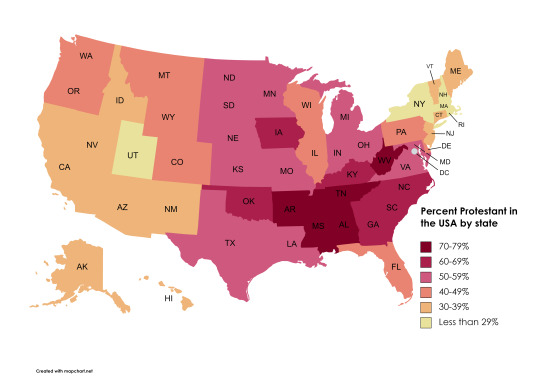

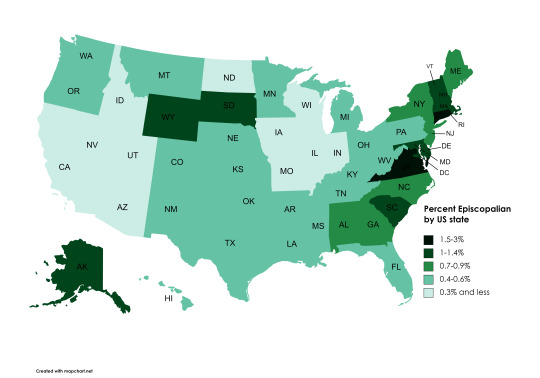


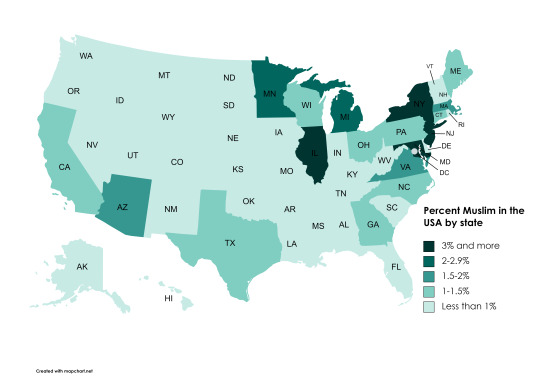



Some of the many religions of the USA
Catholic Christian, Protestant Christian, Jewish, Episcopal Christian, Mormon Christian, Irreligion, Islam, Buddhism, Eastern Orthodox Christian, Hindu
#map#maps#cartography#usa#data#americas#geography#religion#christians#christblr#christianity#jewish#judaism#islam#muslims#hindu#angels in america#mormon#lds#mormonism#Catholic#folk catholic#catholicism#california#new york#faith#religions
872 notes
·
View notes
Text
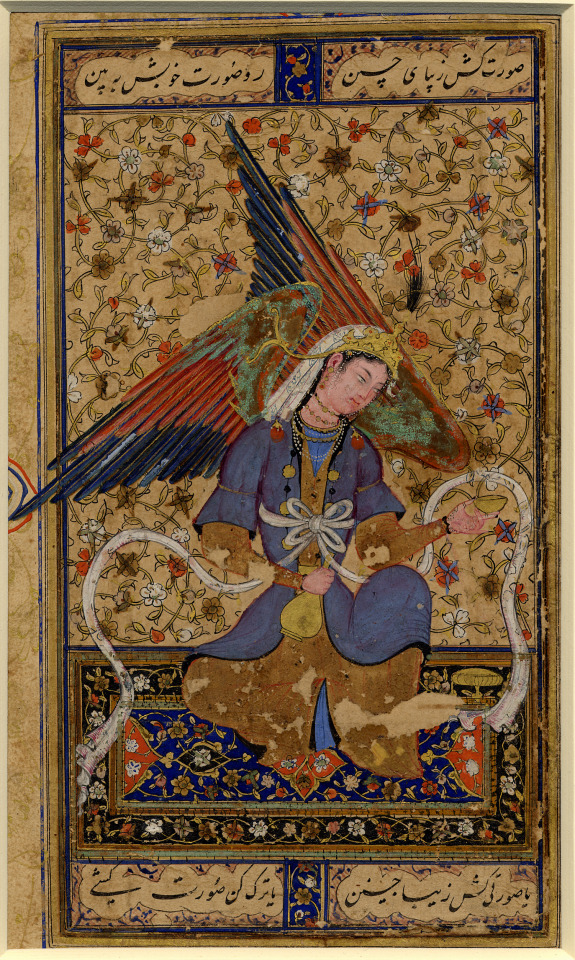
An angel, ca 1555 AD.
Bukhara, Uzbekistan
British Museum
428 notes
·
View notes
Text

the one day I was finally able to sit upright and not be in pain and i chose to draw Jibril being the absolute worst angel known to all mankind
#anthro#furry#dog#shark#angel#Jibril = basically the islamic Gabriel#his internet username really is probably just HELLA_GAYBRIEL in all caps#Suspicious Fish Halo also making an appearance as always. What will they do??
165 notes
·
View notes
Text
by Dr. Sheila Nazarian
My family immigrated to Los Angeles from Iran when I was a child, fleeing the religious persecution that Jews in Iran are subjected to.I’m thrilled to see the Persian community being recognized for what we bring to the table — for Jews and for America at large. I’ve said for a long time that the American Jewish community has a problem listening to its smaller constituencies, particularly Middle Eastern Jews who don’t vote, act, or look like them. Persian Jews usually hold more conservative positions than the rest of our Jewish counterparts, particularly with regard to foreign affairs and the dangers of radical Islam — but it is because we know these dangers acutely. It did not take the biggest massacre of Jews since the Holocaust for us to see them.
We know these dangers, and have been sounding the alarm about them, precisely because we have lived through and fled them. My family fled Iran, hiding in the back of a pickup truck being shot at by border police, after the Islamic Revolution, when the ayatollahs took the sophisticated, cosmopolitan society I remember from my early childhood and transformed it in a dystopian theocracy that detests women and detests Jews even more. Along with the thousands of other Jewish families who fled, we were among the first victims of the jihadist wave that started then and is still crashing over the world today, with Iran funding the terrorist proxies — from Hamas to Hezbollah — that wreak havoc through the Middle East and hope to do the same to the Western world.
This is why Persian Jews warn continuously of the evils of radical Islam — we know how it can destroy once-thriving societies until they are unrecognizable, and we know the way this destruction can spread. We understand the pressing, urgent danger that Iran poses to the West, and we understand the need to elect officials and back policies informed by this understanding, even if it means a shift from the traditional American Jewish party line.
40 notes
·
View notes
Text
Named Angels
Fallen angels are not included. Neither are gnostic angels because I'm tired.
Aker: Named in the Greek Apocalypse of Ezra as one of the nine angels who will govern at the end of the world.
Al-Khidr: Also known as al-Khadir, Khader, Khidr, Hidr, Khizr, Kathir, Khazer, Khadr, Khedher, Khizir, Khizar, or Khilr. The Servant of God whom Moses accompanies in the Quran is identified as Al-Khidr by Islamic scholars.
Ambriel: Ambriel is an angel associated with the month of May.
Arariel: Described in the Talmud as the angel in charge of the waters of the Earth.
Ariel: An angel in Jewish and Christian mysticism. Ariel has dominion over beasts, creative forces, the North, and elemental spirits.
Arphugitonos: Named in the Greek Apocalypse of Ezra as one of the nine angels who will govern at the end of the world.
Artiya'il: An angel appearing in the hadith. Artiya'il removes grief and anxiety from humans.
Atid: One of two angels in Islamic tradition who records a person's actions. This record is used to confront each person on the Day of Judgment.
Azrael: The angel of death. Azrael is one of the four archangels in Islam.
Beburos: Named in the Greek Apocalypse of Ezra as one of the nine angels who will govern at the end of the world.
Camael: Also known as Chamuel, Khamuel, Camiel, Cameel and Camniel. One of the twelve Kabbalah angels, Camael is assigned to the fifth sephirah in the tree of life.
Cassiel: Also known as Qafsiel or Qaspiel. In Jewish and Christian mysticism, Cassiel is described by various roles, such as the angel of Saturn the angel of the moon, the angel of tears, and the angel of temperance. Cassiel is sometimes said to preside over the death of young men.
Dobiel: Also known as Dubbiel. Dobiel is the guardian angel of Ancient Persia.
Gabriel: An angel who announces God's will to men. Gabriel is considered in archangel in Jewish, Christian, and Islamic traditions. Gabriel appears to Daniel to explain his prophetic visions. Gabriel foretold the birth of John the Baptist to Zechariah and the Annunciation of Jesus to Mary. Gabriel appeared twice to Muhammad. In the church of Jesus Christ of Latter Day Saints, Gabriel lived a mortal life as the prophet Noah. Gabriel was named in the Greek Apocalypse of Ezra as one of the nine angels who will govern at the end of the world.
Gabuthelon: Named in the Greek Apocalypse of Ezra as one of the nine angels who will govern at the end of the world.
Haniel: Also known as Hananel, Anael, Hanael or Aniel. Haniel is sometimes listed as one of the seven archangels. In Kabbalah, Haniel is associated with the seventh sephirah.
Jegudiel: Also known as Iehudiel. Jegudiel is one of the seven archangels of the Eastern Orthodox Church tradition. Jegudiel is the patron saint of hard work and leadership and is often depicted holding a whip (as a punishment for sinners) and a crown (as a gift for the righteous).
Jerahmeel: Also known as Jeremiel, Eremiel, or Ieremihel. Jerahmeel is recognized as an archangel in Lutheran, Angelican, and Orthodox traditions. Jerahmeel is said to comfort the righteous dead in the Bosom of Abraham, or to guard heaven with St. Peter.
Jophiel: Also known as Dina, Iophiel, Iofiel, Jofiel, Yofiel, Youfiel, Zophiel, or Zuriel. In Anglican tradition, Jophiel is an archangel and in Kabbalah, Jophiel is associated with the sephirah chokmah. Some sources list Jophiel as the angel who guards the garden of Eden with a flaming sword.
Kalqa'il: Kalqa'il is an Islamic angel who guards the entrance of the fifth heaven.
Lailah: An angel appearing in the Talmud. Lailah is associated with conception, pregnancy, and the night.
Maalik: An Islamic angel of hell. Maalik carries out God's punishment on wrongdoers.
Metatron: Described in the Talmud as the heavenly scribe, Metatron is allowed to sit in the presence of God to record the deeds of Israel. Metatron was mistaken by Elisha ben Abuyah for a deity, and was subsequently lashed 60 times with a fiery rod to demonstrate that the Metatron was an angel and could be punished, unlike a god. In mystic writings, Metatron is the form Enoch took after his ascension. In Islam, Metatron is the angel of the veil and alone knows what lies beyond it.
Michael: Also known as Mika'il or Mikal. The prince of Israel and prince of the Heavenly Host. Michael is regarded as an archangel in Jewish, Christian, and Islamic tradition, and is the only angel explicitly identified as an archangel in the Christian Bible. In the book of Daniel, Michael fought the prince of Persia. In Revelation, Michael fought Satan and cast him out of heaven. Michael and Gabriel are the angels said to have shown Muhammad paradise and hell. In Jewish tradition, Michael prevented the sacrifice of Isaac by providing a ram. Seventh Day Adventists and Jehovah's Witnesses believe Michael is another name for Jesus in heaven. In the Church of Jesus Christ of Latter Day saints, Michael is the same person as Adam. Michael is named in the Greek Apocalypse of Ezra as one of the nine angels who will govern at the end of the world.
Moroni: In angel in the Church of Jesus Christ of Latter Day Saints. Moroni was the guardian of the golden plates from which Joseph Smith wrote the Book of Mormon, and appeared to Smith numerous times.
Muriel: Muriel is a Domination, a class of angel in the second angelic sphere. Muriel is associated with the month of June.
Nuriel: Regarded in some traditions as the same being as the angel Uriel. Nuriel is the angel of hailstorms and commands an army of 500,000 angels made of water and fire.
Pahaliah: Pahaliah is the angel of Redemption. Pahaliah is a throne, an class of angel in the first angelic sphere.
Puriel: Puriel accompanied Abraham on a journey to heaven. Puriel is tasked with examining the souls of those brought to heaven.
Raphael: Known in Islam as Israfel or Israfil. Raphael is regarded as an archangel in Jewish, Christian, and Islamic traditions. It is believed that Raphael is the angel in the Gospel of John who stirs the pool of Bethesda. In Islam, Raphael will blow the trumpet which signals the Day of Judgment, and the hadith lists him as the angel closest to God. Named in the Greek Apocalypse of Ezra as one of the nine angels who will govern at the end of the world.
Raqib: One of two angels in Islamic tradition who records a person's actions. This record is used to confront each person on the Day of Judgment.
Raziel: Also known as Gallitsur. Raziel is the angel of secrets and mysteries, and the keeper of all magic. In Kabbalah, Raziel is associated with the sepirah chokmak.
Riḍwan: Also known as Riswan. Riḍwan is an Islamic angel who guards the gates of heaven.
Sabrael: Sabrael is an angel appearing in the apocryphal works the Testament of Solomon and 3 Enoch.
Sachiel: Also known as Sariel, Suriel, Suriyel, Sikhael, Sixael, Satquel, Satquiel, Saquiel, Seriel, Sauriel, Saraqael, Sarakiel, Suruel, Surufel, Souriel, or Sachquiel. Sachiel is a cherub who is associated with charity and wealth.
Sahaquiel: Listed as one of the archangels in the Third Book of Enoch. Sahaquiel is attended by "496,000 myriads of ministering angels."
Samkhiel: An angel of Gehenna, Samkhiel is the angel of destruction. Samkhiel torments the wicked to cleanse their souls and eventually reuinte them with God.
Sandalphon: An archangel in mystical traditions of Judaism and early Christianity. Sandalphon is said to gather prayers and bring them to God. Some sources regard Sandalphon as an angelic ascension of Elijah.
Sarathiel: Also known as Serathiel. Sarathiel is an archangel in the Oriental Orthodox tradition.
Selaphiel: Also known as Sealtiel, Selatiel, or Selathiel. Selaphiel is regarded as an archangel in the Byzantine Catholic and Greek Orthodox traditions. Selaphiel is sometimes viewed as the angel in Revelation who offers people's prayers to God.
Uriel: Also known as Phanuel. Uriel is often depicted as a cherub and is the angel of repentance. Uriel is regarded as an archangel in Russian Orthodox, Eastern Orthodox, Ethiopian Orthodox, and Anglican traditions, as well as in Kabbalhah. Named in the Greek Apocalypse of Ezra as one of the nine angels who will govern at the end of the world.
Uziel: Also known as Usiel. Uziel is an archangel in 3 Enoch.
Yahoel: Also known as Jahoel, Jehoel, or Yaoel. Yahoel is charged with destroying idolators and restraining the Leviathian. Some sources list Yahoel as the chief angel of the Seraphim. Another lists Yahoel as one of the names of Metatron.
Zadkiel: Also known as Hasdiel. In Kabbalah, Zadkiel is an archangel associated with the fourth sephirah.
Zaphkiel: Also known as Tzaphqiel, Tzaphkiel, Zaphchial, Zaphiel, or Zelel. Zaphkiel is the chief angel of the thrones and is regarded in some traditions as the same angel as Raphael.
Zebuleon: Named in the Greek Apocalypse of Ezra as one of the nine angels who will govern at the end of the world.
Zephaniel: Zephaniel is the chief angel of the Ishim in Kabbalah.
Zerachiel: Also known as Zachariel, Zakhariel or Saraqael. An angel who leads souls to judgment and is set over those who "sin in the spirit."
Zotiel: Zotiel is an angel mentioned in the Book of Enoch.
162 notes
·
View notes
Text
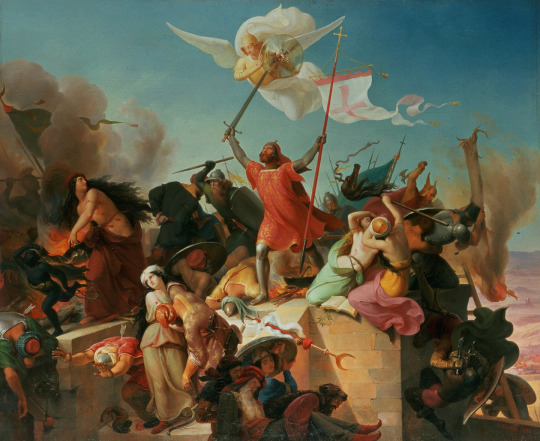
Godfrey of Bouillon by Heinrich Mücke
#godfrey of bouillon#godefroy de bouillon#frankish#crusader#jerusalem#first crusade#art#heinrich mücke#crusaders#crusade#crusades#medieval#middle ages#franks#knights#knight#history#holy war#european#christianity#christian#christendom#angel#angels#siege#battle#flag#standard#islam#muslim
34 notes
·
View notes
Text
about Angels..
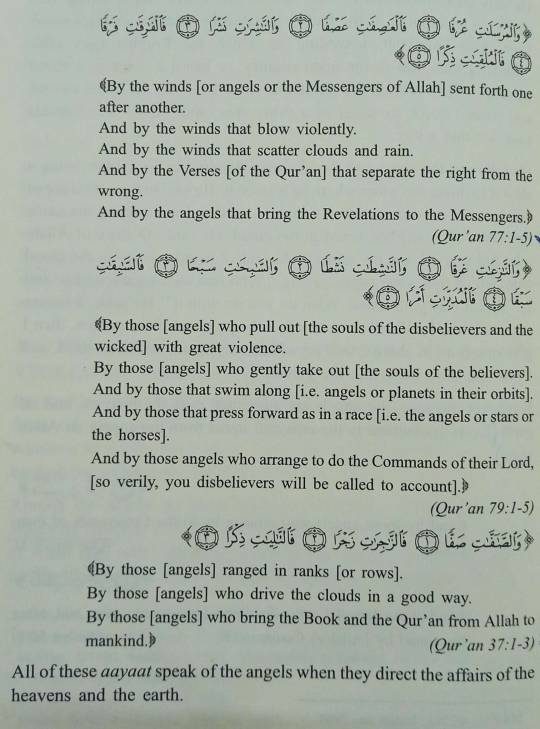
25 notes
·
View notes
Text
Ты видишь неправильно..
Этот ребенок не спит.
Он погиб во время израильской бомбардировки.

Yanliş gormeyin lutfen..
Bu bebekh uyumuyour.
israil bombalari ile şehid oldu..
#palestine#gaza#gaza under attack#genocide in gaza#war crimes#child murder#murder israel#tumblr#türkiye#silent world#world#unicef#united nations#usa#europe#flowers#angels#islam#ummah
61 notes
·
View notes
Text
Look I don't want to criticize religion too much...only TWO of the seven archangels were named?!
Michael and Gabriel, THAT'S IT, the hell?! Way to pass the buck to the next prophet to come up with cool names and powers, its AMAZING the Judeo-Chrisitian-Islamic shared multiverse sells as many books with such sloppy world building.
30 notes
·
View notes
Text
Okay, man, hold on. Everything is clunking into place for me, after reading this post about Aziraphale being Israfil in Islam, the angel whose job it is to blow the cosmic horn that starts Armageddon.

And so then, Crowley is the Serpent of Eden, who sets the human story in motion, and, presumably, the need for an Armageddon, where humans are measured and sorted into Good and Bad, sent to Heaven or Hell.

And someone else in another post I read long ago pointed out that Crowley signs to start the Armageddon process at the beginning of the series.
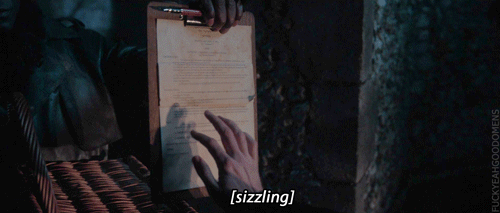
While Aziraphale signs for the package with the tools of the Four Horsepersons, at the end of the series, to end the Armageddoff process. [I could not find a gif or a video of this anywhere, so sorry, you get a crappy photo of my screen I took with my phone.]

So, once again, their roles are reversed --
Crowley starts humanity, Aziraphale is supposed to end it.
Crowley starts Armageddon, Aziraphale ends it.
And Aziraphale ends it in another sense, too, as he's the one [in the series, not in the book] whose creativity and critical thinking skills come up with the argument about the Great Plan vs the Ineffable Plan.
This has also got me thinking about how Aziraphale and Crowley, despite being absolute grade A idiots, are actually ridiculously powerful.
If Aziraphale is one of the ten most important angels, and his job is to literally end everything, it explains some things. Like why the other angels are so insistent on getting him back up to Heaven, instead of just writing him off as a weirdo and a soon-to-be casualty of the War. Like why the Metatron says, "We will leave the portal open for you, do not dawdle." Like why the Quartermaster angel says, "Your whole platoon is waiting for you."

And then there's Crowley. And there're lots of people who like the idea that he's just a nobody in Hell. "They just said, get up there and make some trouble." But then again, he's the only demon we know of who can stop time.

He's the only demon who has an imagination. Which. If all the demons and Satan fell at the same time, for asking questions. I wonder what changed. Why has Crowley kept asking questions, which seems to me to be crucially linked to having an imagination. Meanwhile Hastur and Ligur and Beelzebub, etc., and even Satan, are fatally literal-minded. Satan is defeated by Adam's creativity in naming his adoptive father as his only meaningful father, breaking the expectation and tradition of bloodline. So that kind of creativity is extremely powerful in the story.
So what else do we not know about Crowley and his power?
#good omens#good omens meta#crowley#aziraphale#israfil#islam#religious meta#powerful aziraphale and crowley#bastard angel#nice demon#mind blown#stuff people probably figured out in 2019
597 notes
·
View notes
Text

Call of the Roohani bird.
Illustration i did of Noora Kamar's story of the same name for Augur Magazine! It's a story about mourning, funerary rites and islamic mysticism !
#my art#original art#illustartion#art#artists on tumblr#check out augur mag 5.2 to read the story btw it's a great piece#angels#mysticism#islamic art
349 notes
·
View notes
Text

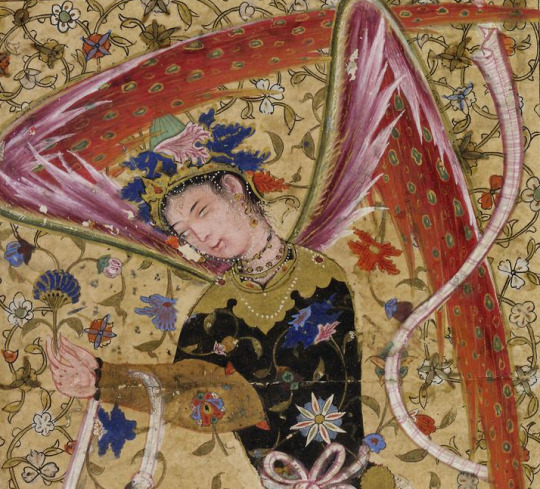
A kneeling peri offering a flower.
Probably Mughal in the style of Bukhara, ca. 1555 AD
British Museum
43 notes
·
View notes
Text
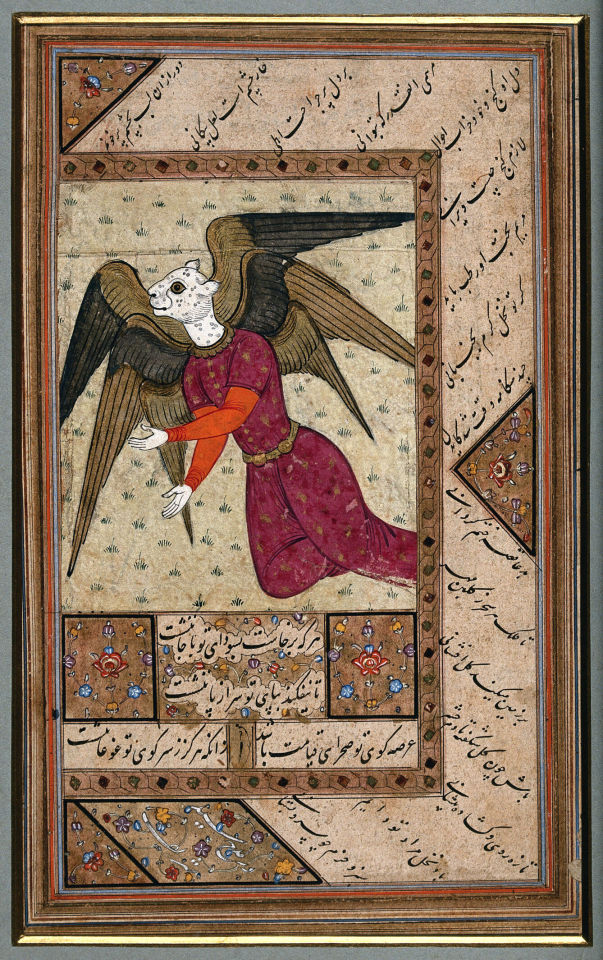
Islamic Angel - Islamic Mughal Empire
14 notes
·
View notes
Text
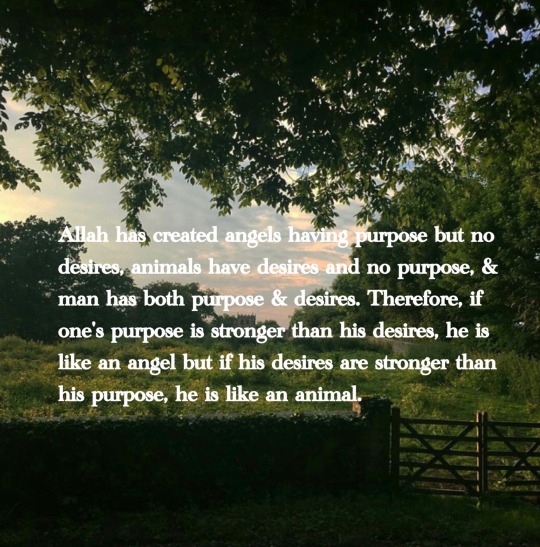
#muslim#islam#muslimah#islam help#muslimah motivation#islamic saying#islamic quote#deen#islamic#islampost#sufism#sufi#angel#animals#beast#know thyself#know the difference#desire#desires#purpose of life#purpose
14 notes
·
View notes
Text
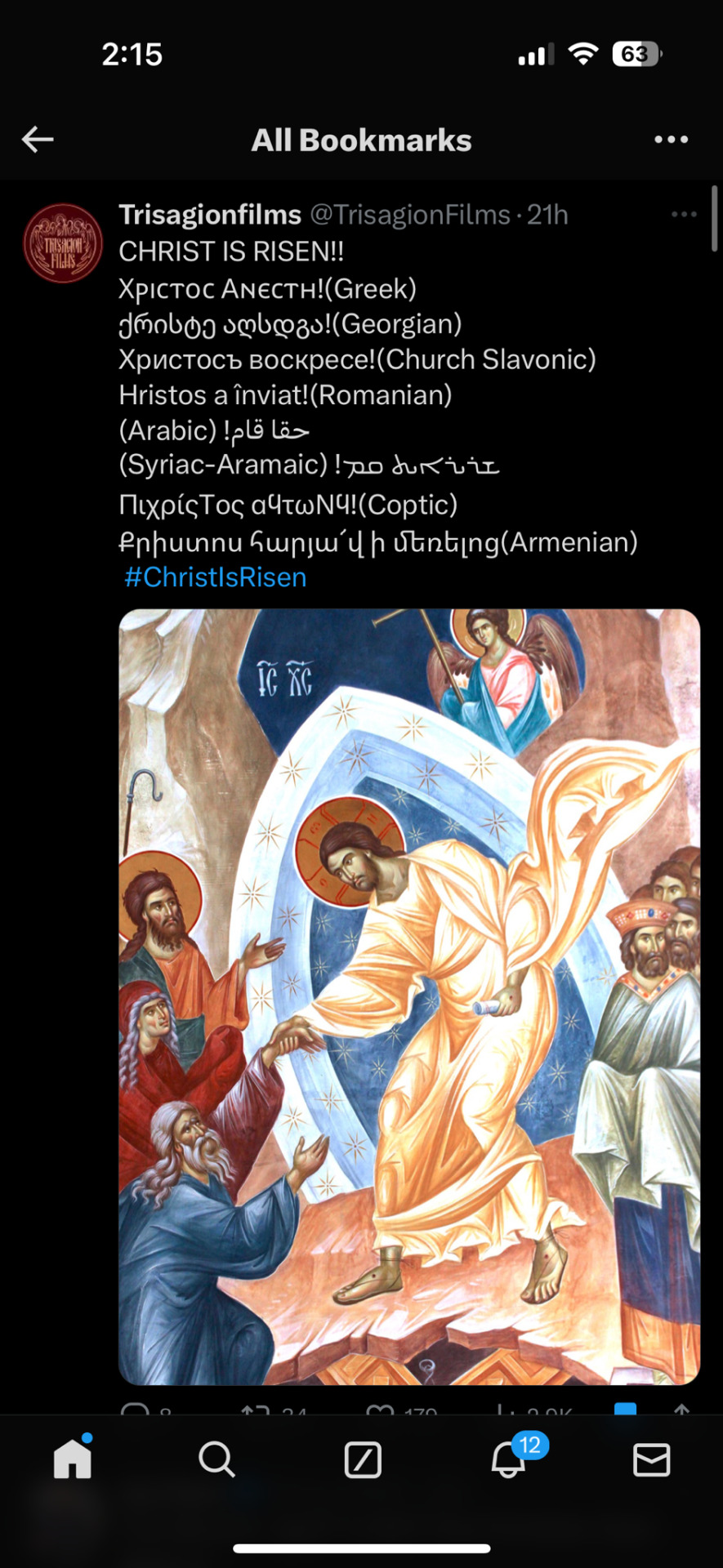
Христо Воскресе! Во Истину Воскресе!
Title: 🕊️ Let's Add a Peaceful Twist to Easter! 🐣 #PeaceOnПасха #EasterHarmony
Description:
Hey TikTok fam! 🌟 With Easter approaching, I've got a heartwarming idea to bring some extra harmony to your celebrations: let's focus on spreading peace! 🕊️🐰 Whether you're planning a traditional gathering or a modern twist, prioritizing peace this Easter can elevate the spirit of the season. Here's why you should #PeaceOnПасха this year:
1. **Unity and Compassion:** Easter is a time of renewal and hope, and what better way to honor its spirit than by fostering unity and compassion? By promoting peace, we can create a sense of togetherness and understanding that transcends boundaries and differences.
2. **Kindness in Action:** Small acts of kindness can have a big impact. Whether it's reaching out to a neighbor in need, volunteering at a local charity, or simply sharing a smile with a stranger, every gesture of peace contributes to a brighter, more compassionate world.
3. **Mindful Reflection:** Easter is an opportunity for introspection and spiritual renewal. Take some time to reflect on what peace means to you and how you can cultivate it in your own life. Whether through meditation, prayer, or quiet contemplation, nurturing inner peace is a gift to yourself and those around you.
4. **Global Harmony:** In a world that often feels divided, Easter reminds us of our shared humanity and the importance of working towards peace on a global scale. Let's join hands with people of all backgrounds and beliefs to promote peace, justice, and equality for all.
5. **Family Connection:** Easter is a time for family and loved ones to come together in celebration. Strengthen bonds and create lasting memories by focusing on love, forgiveness, and reconciliation. Embrace the opportunity to mend relationships and build a foundation of peace within your family circle.
So, are you ready to embrace the spirit of peace this Easter? 🎉 Let's spread the message of #PeaceOnПасха and inspire others to join us in creating a world filled with love, compassion, and harmony. Don't forget to share your acts of peace and tag me – I can't wait to see the ripple effect of kindness! 🕊️✨ #EasterHarmony #SpreadLoveNotHate
#jesus christ#jesus#faith in jesus#christianity#christian broadcasting network#christian living#christian blog#пасха#пасхальный кулич#иисус христос#воскресенье#church#greek orthodox#palestine#israel#islam#holy quran#holy bible#holy spirit#holy week#holiday#faith#faith in god#faith the unholy trinity#keep the faith#faithinchrist#faithoverfear#faithinthefuture#war is real#angels
5 notes
·
View notes
Text
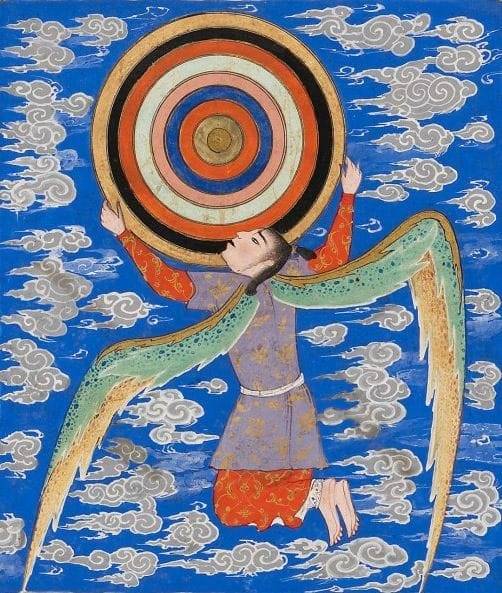
The Angel Ruh holding the celestial spheres, from ʿAjāʾib al-makhlūqāt (Wonders of Creation) of Qazwini, Iran, ca. 1550. Ink, opaque watercolor and gold on paper.
Ashmolean Museum, Oxford
“In Islamic cosmology, angels play a central role as divine agents. As attested by popular medieval cosmographical treatises such as the ʿAjāʾib al-makhlūqāt [Wonders of Creation] of Qazwini (ca. 1203–83), the world of angels (ʿālam-i malakūt) was believed to be closer to the world of absolute truth-reality (ʿālam-i hāhūt or ḥaqīqat) than our material realm. As Chittick explains, “the imaginal world is more real than the corporeal world, since it is situated closer to the World of Light, though it is less real than the spiritual and luminous realm of the angels”. Rooted in Quranic and hadith literature, and popularized in the medieval world by Ibn Sina, Muslim angelology saw each created world in the cosmic hierarchy as governed by a specific angel. According to this system, it is the angels who activate God’s power, qudrat, in the cosmos and maintain its balance and harmony. In both the microcosm of the inner human being and the macrocosm of the outer world, angelic perfection is reflected through their outer beauty as well.”
#Angels#ʿAjāʾib al-makhlūqāt (Wonders of Creation) of Qazwini#The Cosmic Hierarchy#Islamic cosmology#The world of angels (ʿālam-i malakūt)
5 notes
·
View notes